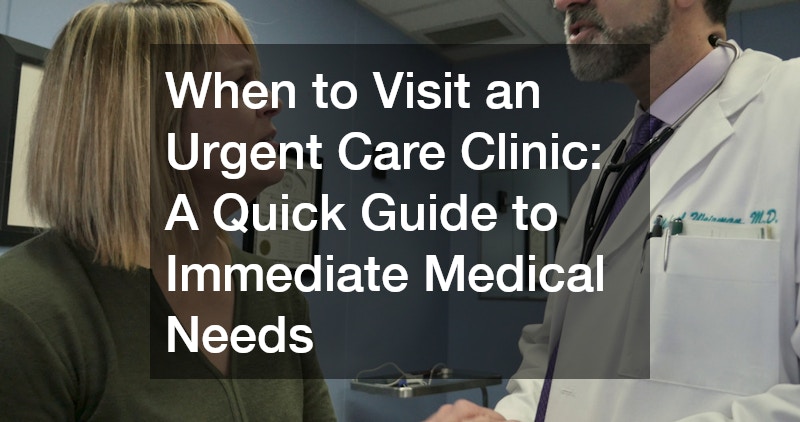
Urgent care clinics have become a pivotal part of the healthcare system, offering immediate medical attention for non-life-threatening conditions. These facilities bridge the gap between routine check-ups in a doctor’s office and emergency care in a hospital. Understanding when to visit an urgent care clinic can save time, reduce medical costs, and ensure that patients receive appropriate care for their specific circumstances.
Red Flags That Require Emergency Attention
While urgent care is beneficial for many situations, some symptoms are red flags that need emergency intervention. Conditions involving difficulty breathing, sudden or severe pain, or serious head trauma should prompt a direct trip to the ER. These symptoms indicate potentially life-threatening issues that require immediate, specialized medical attention only an emergency department can provide.
Another critical sign requiring emergency care includes symptoms of a possible stroke, such as sudden weakness or numbness, confusion, or visual disturbances. Similarly, heart attack indicators like chest pain or pressure, especially accompanied by shortness of breath, necessitate emergency services. Recognizing these red flags can significantly affect outcomes by ensuring timely and appropriate medical responses.
Essential Documents and Information
Preparation can make your urgent care visit more efficient and effective. Important documents to bring include identification such as a driver’s license, medical insurance information, and a list of current medications. Having a medical history on hand, including past surgeries or chronic conditions, can significantly aid the healthcare provider in giving accurate treatment.
Knowing your personal and family medical history can assist the urgent care staff in diagnosing and treating your condition. Being prepared with this information helps avoid unnecessary delays while waiting for accurate medical records to be assessed. A well-documented medical history is instrumental in speeding up the treatment process and ensuring that all health considerations are taken into account.
Insurance and Payment Information
Understanding how insurance interacts with urgent care services can prevent unforeseen expenses. Most urgent care clinics accept a variety of insurance plans, but checking in advance can prevent surprises. Even with insurance, there may be co-pays or deductibles involved, so being informed about your coverage helps manage expectations.
For those without insurance, urgent care offers a more affordable alternative to emergency room visits. Many clinics offer transparent pricing and allow patients to pay out-of-pocket at rates typically lower than hospital charges. Knowing these options ahead of time prepares patients for the financial aspects of receiving urgent care.
Preparing for a Child’s Visit to Urgent Care
Taking a child to urgent care involves unique considerations to ensure the visit is as stress-free as possible. Bring any necessary items such as a favorite toy or blanket to comfort the child, alongside essentials like identification and insurance information. Having a list of the child’s symptoms and any medications they’re taking will assist healthcare providers in delivering appropriate care.
Understanding the protocols and expectations when bringing a child to urgent care can ease anxiety for both parent and child. Pediatric care requires careful attention to detail, so being prepared with a thorough medical history facilitates accurate, timely treatment. Discussing what to expect during the visit ahead of time can help soothe a child’s nerves.
Quick Access to Care
Urgent care clinics are known for their quick access and reduced wait times compared to emergency rooms. This efficiency enhances patient experience by providing timely care for non-emergent conditions. With an emphasis on speed without sacrificing quality, urgent care facilities aim to address medical issues swiftly and effectively.
Many patients find that the streamlined processes at urgent care clinics result in less time spent waiting for treatment. This quick turnover is essential for those with busy schedules who cannot afford prolonged visits at a healthcare facility. Offering walk-in appointments also adds to the convenience, accommodating those unplanned medical needs with ease.
Cost-Effective Treatment Options
Urgent care clinics provide cost-effective treatment options particularly beneficial for the uninsured or underinsured. Offering lower prices for visits with less overhead than hospitals, these clinics make healthcare more accessible. For those managing medical expenses, urgent care can alleviate the financial burden of obtaining necessary care.
Affordability doesn’t undermine the quality of care delivered at urgent care centers. Patients receive comprehensive services without the higher charges associated with emergency room care. This cost efficiency supports the goal of providing valuable and high-quality healthcare to all patients, regardless of financial status.c.
Comprehensive Care for Non-Emergent Conditions
Urgent care centers are equipped to handle a wide array of non-emergent medical issues, ensuring comprehensive care. Clinics provide crucial services such as laboratory testing and diagnostics, covering a broad spectrum of common ailments. This capability positions urgent care as a versatile option for addressing diverse health concerns.
Understanding when to visit an urgent care clinic is key to receiving timely and appropriate medical attention. Urgent care offers many advantages over emergency care for conditions that are non-life-threatening but require prompt attention. By making informed choices, patients can better utilize urgent care services, ensuring a balance between cost, efficiency, and quality of care.




